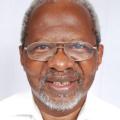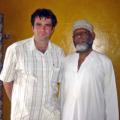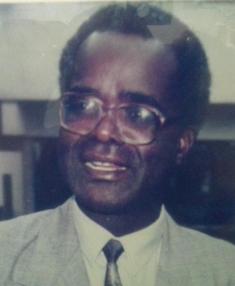25. Wise Guys: Sage Philosophy
Henry Odera Oruka’s new method for exploring philosophy in Africa, based on interviews with wise individuals.
Themes:
• A. Graness and K. Kresse (eds), Sagacious Reasoning: Henry Odera Oruka in Memoriam (Nairobi: 1999).
• M. Griaule, Conversations with Ogotemmêli: An Introduction to Dogon Religious Ideas, (Oxford: 1965).
• B. Hallen, J. O. Sodipo, Knowledge, Belief, and Witchcraft: Analytic Experiments in African Philosophy (Stanford: 1997).
• B.B. Janz, Philosophy in an African Place (Lanham: 2009), Chapter 4.
• K. Kresse and O. Nyarwath (eds), Rethinking Sage Philosophy: Interdisciplinary Perspectives on and beyond H. Odera Oruka (Lanham: 2022).
• D.A. Masolo, African Philosophy in Search of Identity (Bloomington: 1994).
• F. Ochieng’-Odhiambo, Trends and Issues in African Philosophy (New York: 2010), ch.4.
• H.O. Oruka, “Sagacity in African Philosophy,” International Philosophical Quarterly 23 (1983), 383–93.
• H.O. Oruka, Sage Philosophy: Indigenous Thinkers and Modern Debate on African Philosophy (Leiden: 1990).
• G.M. Presbey, The Life and Thought of H. Odera Oruka: Pursuing Justice in Africa (London: 2023).
Stanford Encyclopedia: African Sage Philosophy







Comments
Erratum
It's actually "Marcel" Griaule not "Maurice" as I say in the episode - was right in the script, I just misspoke while recording!
Need I say this?
One would say that Odera Oruka's “Sage Philosophy Project” was indeed an eye opener about African sages who were otherwise unheard, and whose rich knowledge and wisdom stayed marginalized in literary and academic oblivion. Odera Oruka must have realised that there was an enormous body of undocumented knowledge (indigenous African philosophies) going to waste and decided to do something about it. Odera's project I believe, was meant to be (a beginning or) a continuation rather than an end to recording indigenous ideas, thought and philosophies.
For those who had the privilege of sitting with Prof Odera Oruka in a social or intellectual setting, one thing stood out. No doubt, Odera Oruka was himself a sage. He had a way of making complex discussions simple. In Africa, they say every African village has a sage. However, the main difference is that a sage can do philosophy, but not every philosopher is a sage. Odera Oruka was a sage and a philosopher rolled into one. Having said all that, one question still lingers on my mind, a question of irony. Did anyone interview and document Odera Oruka the sage, rather than the philosophy scholar? Oruka was a thinker or "Japaro" in his Luo language, a philosopher and a sage. It is easy (or difficult?) to see a gaping omission. A missed opportunity to interview and document Oruka the African sage.
In reply to Need I say this? by Fred Okello
Interviewing the interviewer
That is a great point and actually, our guest Kai Kresse (who appeared on the following episode) did do an interview with Oruka, which was published in:
A. Graness and K. Kresse (eds), Sagacious Reasoning: Henry Odera Oruka in Memoriam (Nairobi: 1999),
The interview is not exactly what you have in mind, perhaps, since it focuses largely on the sage philosophy project itself - it would have been interesting to ask Oruka the same questions that he and his team asked the folk sages! But in the interview you do get to hear (well, read) Oruka's views on a range of issues so it is well worth tracking down.
Add new comment